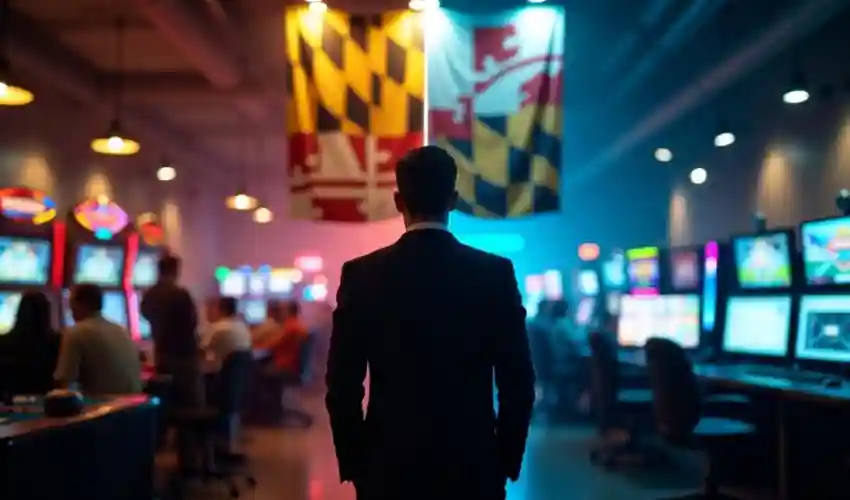Maryland is making sweeping changes to its online gambling landscape, targeting unregulated sweepstakes casinos while pushing for the legalization of regulated iGaming. Senate Bill 860, introduced by Senator Paul Corderman, aims to ban online sweepstakes casinos, citing concerns about consumer protection and market integrity.
At the same time, Maryland lawmakers are advancing Senate Bill 340, which seeks to establish a regulated iGaming market under the Maryland Lottery and Gaming Control Commission. This dual approach reflects a strategic shift—cracking down on unregulated gambling while creating a structured, taxed, and monitored online casino industry.
We can help you obtain your Gambling License
Maryland’s Legislative Crackdown: Banning Sweepstakes Casinos While Advancing iGaming Legalization
Key Legislative Developments:
🔹 Senate Bill 860 aims to ban online sweepstakes casinos and penalize supporting entities.
🔹 Senate Bill 340 proposes a regulated iGaming framework, including licensing fees and social equity measures.
🔹 Stakeholders are divided on the impact of these legislative efforts on the gambling industry.
With these proposals, Maryland stands at a critical turning point in shaping its digital gambling ecosystem.
Senate Bill 860: Targeting Unregulated Sweepstakes Casinos
In a significant move, Maryland lawmakers have introduced Senate Bill 860, aiming to ban online sweepstakes casinos within the state. Sponsored by Senator Paul Corderman, this legislation seeks to prohibit internet-based contests that simulate casino-style gaming or sports betting and employ a dual-currency system to distribute cash prizes. The bill also targets entities that support such operations, including financial institutions, payment processors, affiliates, and gaming content suppliers.
Maryland’s iGaming Legalization Efforts: Senate Bill 340
The proposed ban comes amid a broader effort to regulate online gambling in Maryland. Senate Bill 340, introduced by Senator Ron Watson, proposes a comprehensive framework for legalizing iGaming under the oversight of the Maryland Lottery and Gaming Control Commission. This bill outlines licensing requirements, including a $1 million fee for a five-year license and mandates for operators to invest in live dealer studios. It also emphasizes social equity by allowing video lottery terminal operators to obtain additional licenses if they partner with social equity applicants who own at least 33% of a joint venture.
The introduction of these bills has sparked a robust debate among industry stakeholders, policymakers, and the public. Proponents of SB 860 argue that banning unregulated sweepstakes casinos is necessary to protect consumers and maintain the integrity of Maryland’s gambling industry. They contend that these platforms often operate in legal gray areas, potentially exposing players to unfair practices and fraud.
On the other hand, opponents of the ban express concerns about potential overreach and unintended consequences. They argue that the broad definition of online sweepstakes in the bill could encompass legitimate businesses, limiting consumer choice and stifling innovation. The Social and Promotional Games Association stated, “This misguided legislation threatens to criminalize a marketing tool utilized daily by thousands of American businesses to promote everything from coffee to cheeseburgers to cryptocurrency.”
Simultaneously, the push to legalize regulated iGaming has its own set of supporters and detractors. Advocates highlight the potential economic benefits, including increased tax revenue earmarked for education and responsible gambling initiatives. They also point to the existing illegal offshore gambling market, arguing that regulation would provide a safer environment for consumers.
Industry Reactions: Supporters vs. Opponents
However, some stakeholders, including operators of brick-and-mortar casinos, express concerns about potential revenue cannibalization. They fear that the convenience of online gambling could divert customers from physical casinos, leading to job losses and decreased revenue. The Cordish Companies, owners of Live! Casino in Maryland, have been vocal in their opposition, citing potential negative impacts on their operations.
As these legislative efforts progress, the future of online gambling in Maryland remains uncertain. The outcome will significantly impact consumers, businesses, and the state’s economy. Stakeholders are encouraged to stay informed and engage in the discussion as Maryland navigates this complex issue.
Maryland stands at a crossroads in its approach to online gambling. The proposed ban on sweepstakes casinos, coupled with efforts to legalize regulated iGaming, reflects a nuanced strategy to balance consumer protection with economic opportunity. As these legislative developments unfold, their implications will resonate across the state’s gambling landscape, influencing policy, industry practices, and player experiences.
Get Expert Assistance with Your Romanian Gambling License
Navigating the Romanian gambling licensing process can be challenging, especially with varying requirements for resident and non-resident companies. Szilaghi Consulting specializes in helping businesses obtain their Class 2 gambling license efficiently and compliantly.
✅ Expert legal and financial guidance
✅ Assistance with company formation and tax registration
✅ Compliance support for ONJN licensing requirements
📞 Contact Szilaghi Consulting today to streamline your licensing process and start operating in the Romanian gambling market!


